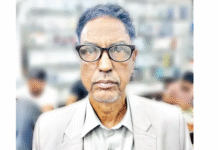Finance Minister AMA Muhith has described the activities of the opposition as irresponsible. He was of course referring to the hartal called for yesterday by the BNP-led 18-party alliance over the rise in fuel prices. While no one will dispute the truism that a hartal or general strike is an accepted political norm in a democracy, one is surely a trifle bewildered when a political party that has been in power more than once in the 41-year history of this country decides in cavalier fashion to order a nationwide shutdown over issues that ought to have been discussed in parliament. Muhith’s assertion that the BNP, having been in government, should be knowing how a government is run certainly makes sense.
For the BNP to have consistently boycotted parliament since it lost the general elections of December 2008 has created a bad precedent for the country. To be sure, the BNP can argue that such a precedent was set in motion by the Awami League when the latter first began staying away from the Jatiya Sangsad in 1994. It was an act that was reciprocated by the BNP when it went into opposition following the return of the Awami League to power in 1996. And once the Awami League went back into opposition after the elections of October 2001, it returned to the old mechanism of a systematic boycott of parliament.
The upshot of it all is that neither of the two major political parties in the country has ever been ready to go into opposition. But if it does find itself in the minority in parliament after an election, it simply can refuse to attend sessions of parliament and can instead raise all its grievances on the street. One would think, even after the return of democracy in 1991, that extra-constitutional rule was still on and that only a recourse to the streets would bring about change. This dark tradition of the elected opposition staying away from the JS has, curiously, also meant that the opposition, be it the AL or the BNP, quietly turning away from the reality of how it tackled the issues while in power and then pretending it had never held office before.
The finance minister’s charge of irresponsible behaviour ought to be regarded as a call to all political parties to demonstrate respect for democratic principles, whether these parties are in power or out of it. That being the thought, it is for today’s opposition to bear in mind that a hartal is a bad option when an elected parliament is out there for issues of national significance to be thrashed out. And it is worse when the observance of a hartal is preceded by such violence as the torching of vehicles on the streets.
In a democracy, politics on the streets is a clear and dangerous invitation to public disorder in the way that a slapping of ever fresh new charges on imprisoned opposition political figures by the government is. That the incarcerated acting secretary general of the BNP was unable to walk free from prison, despite being granted bail by the judiciary, because he was shown arrested in new cases, does not augur well for the future of democracy in Bangladesh. Neither does it make citizens feel comfortable when the opposition demands that an elected government relinquish power or be removed from it.
The truth remains: democracy, despite the 22 years which have gone by since it was restored in the country, remains in a tenuous state. The inability of the political classes, on both sides of the spectrum, to demonstrate mutual respect, to consult each other on issues of grave public importance, to debate in parliament, to impress the nation with their visions of the future, to reinvent themselves in line with 21st century needs, has already taken a huge toll of the nation’s energy and patience.
Things need not go on in this pernicious manner.
Source: The Daily Star









